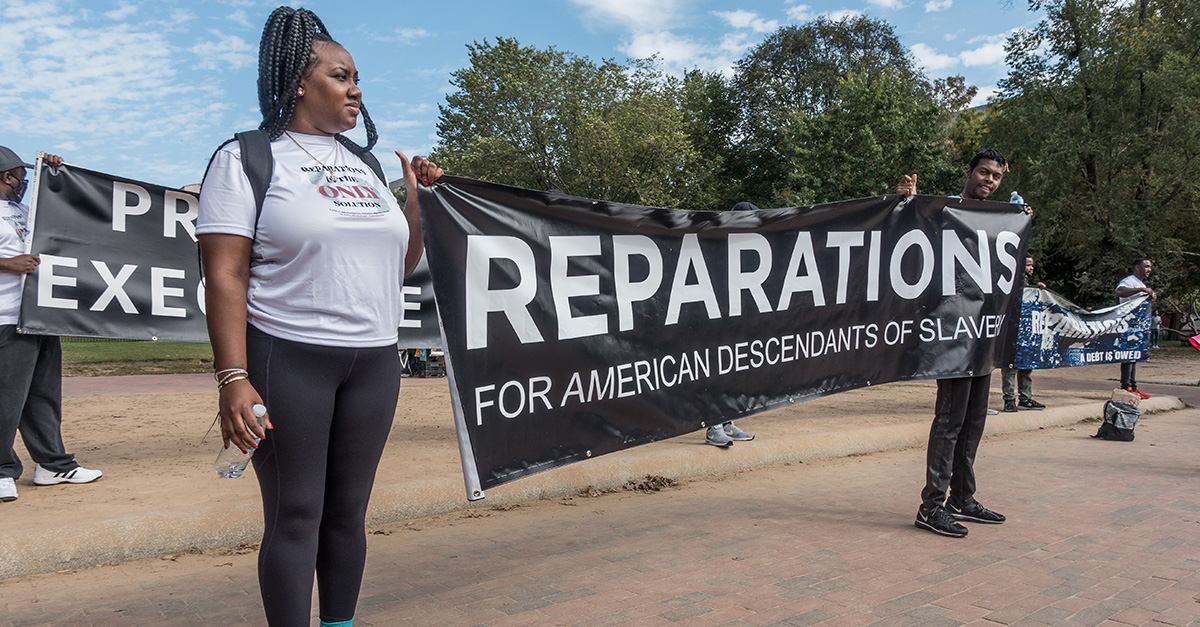


Get a free copy of Parental Rights & Education when you subscribe to our newsletter!

Using government force to compel individuals who were never slaveowners to pay those who were never slaves isn’t biblical justice but is actually a form of injustice, revenge, and envy.
The rise of social justice, Critical Theory, and wokeness in America has sparked another conversation, another debate, on the question of “reparations.”
Reparations, in general, are defined as “the making of amends for a wrong one has done, by paying money to or otherwise helping those who have been wronged.”
It’s important to point out at the outset of this article providing a biblical worldview on reparations that not all reparations are unbiblical.
Reparations, or restitution, should be made to those who have been wronged — but only ever by the ones who have actually done the wrong against the hurt party.
Numbers 5:6-7 teaches:
“When a man or woman commits any of the sins of mankind, acting unfaithfully against the Lord, and that person is guilty, then he shall confess his sins which he has committed, and he shall make restitution in full for his wrong and add to it one-fifth of it, and give it to him whom he has wronged.”
Those are biblical reparations — the living party who did wrong to another living party working, and paying, to make it right.
But that’s not what the American debate on reparations is about. In our present context, the political conversation is almost exclusively focused on making currently living white Americans who never owned slaves to pay money to living descendants of African slaves in our country who have never themselves lived in slavery and who haven’t been wronged by those same white Americans.
One of the most prominent essays calling for this form of reparations came from the activist Ta-Nehisi Coates in his 2014 piece titled “The Case For Reparations,” published in The Atlantic. The subhead summarized his reasoning: “Two hundred fifty years of slavery. Ninety years of Jim Crow. Sixty years of separate but equal. Thirty-five years of racist housing policy. Until we reckon with our compounding moral debts, America will never be whole.”
The article is lengthy and full of what can only be assumed to be genuine examples of past discrimination. But the conclusion is loud and clear: White Americans living today who have never participated in those acts of discrimination and injustice are nonetheless both morally culpable and responsible for setting those past wrongs right today.
From an ostensibly Christian perspective, pastors Duke Kwon and Gregory Thompson wrote an entire book, titled Reparations: A Christian Call for Repentance and Renewal, that attempted to make a “Christian case” for the position of Coates and others. Kwon and Thompson argue that “Reparations is best understood as the deliberate repair of White supremacy’s cultural theft through restitution (returning what one wrongfully took) and restoration (restoring the wrong to wholeness).”
In his lengthy and excellent critical review of Kwon and Thompson’s book, Pastor Kevin DeYoung summarizes their argument like this: “In other words, reparations are about what we owe and what is due.”
He explains, “Kwon and Thompson call ‘the Christian church in America to embrace reparations as central to faithful Christian mission in this culture,” adding, “This is the key theological and ethical claim—one that I find ultimately ambiguous, unworkable, and unpersuasive.”
DeYoung is right. The call for present-day reparations, enacted under the threat of government force and through the means of government confiscation and redistribution of tax dollars, is indeed “ambiguous, unworkable, and unpersuasive.” Even more, it is unjust.
For the remainder of this article, we will approach the topic of reparations from a perspective rooted in a deep understanding of biblical principles faithfully applied to our lives today. While the call for reparations is often seen as a means of addressing historical injustices, it is crucial to consider whether it aligns with the principles of justice, love, and forgiveness that the Bible advocates.
Again, one of the central concerns regarding reparations is the use of government force to compel individuals who were never slaveowners to pay money to the descendants of slaves even though those descendants were themselves never slaves. This raises serious questions about justice and fairness and how the argument in favor of reparations is actually a form of injustice, envy, and revenge.
The Bible contains numerous verses that emphasize the importance of justice and fairness. Two of these fundamental principles are 1) theft is wrong, and 2) individuals should be responsible for their own actions and not bear the guilt or consequences of others’ transgressions.
In Exodus 20:15, the Eighth Commandment teaches us that “Thou Shalt Not Steal.” Stealing is the act of taking from someone something that does not belong to you. In other words, you have no rightful claim of ownership of their items or wealth, and they have no moral responsibility to give it to you, but you take it anyway. In our modern day, that is exactly what reparations would be — an act of massive theft.
The second principle is expressed in Ezekiel 18:20:
“The one who sins is the one who will die. The child will not share the guilt of the parent, nor will the parent share the guilt of the child.”
From a biblical perspective, justice involves holding individuals accountable for their own deeds and not imposing collective guilt or punishment. Reparations that target individuals who were never directly involved in acts of injustice can be seen as a violation of this principle.
As Pastor Tom Hicks explains in his article, “Race Reparations: Missing the Law and the Gospel,”
“The problem with reparations is that God’s law forbids class reparations for sins committed by a group’s ancestors in the 8th commandment, “do not steal” (Ex 20:15). Certainly, the law of God teaches that individuals should make restitution for their own sins (Num 5:5-10; Lk 19:1-10). But the law of God does not permit any group to steal money from another group because of historic sins for which the individuals in the current group are not responsible.
The fact that many Christians are advocating race reparations proves that when they do not have a clear doctrine of the law of God, they will tend to adopt the unbiblical ethics of the culture and insist that the church should practice them.”
True biblical justice, as opposed to the social justice that undergirds reparations, is the act of ensuring that everyone receives what they are rightfully due. As DeYoung puts it, “The case for reparations becomes less cogent when it is applied across centuries, across a continent, and across families irrespective of any other consideration except for skin color.”
Reparations, therefore, violate biblical principles and are unjust. As the old saying goes, “Two wrongs don’t make a right.”
Reparations are not just unjust in principle, but the entire conversation and desire for reparations can lead to other sins and wrongs. DeYoung, again, points out that The Christian Case for Reparations as presented by Kwon and Thompson has “an even bigger problem” in its “moral logic,” and “that is the conspicuous absence of grace, of forgiveness, or even of quid pro quo satisfaction.”
The Bible contains numerous warnings against envy and revenge. These emotions can be destructive and lead to further division and injustice. Proverbs 14:30 advises, “A heart at peace gives life to the body, but envy rots the bones.” Envy can corrode the soul and lead to a desire for revenge or retribution.
Reparations, as they are often framed, can be driven by a sense of envy and a desire for vengeance. Envy is the resentment of others’ success or blessings, and it can manifest as a desire to take away from those perceived as having too much. This attitude is contrary to the biblical principle of contentment and gratitude, as seen in Hebrews 13:5: “Keep your lives free from the love of money and be content with what you have.”
Additionally, revenge is discouraged throughout the Bible. Romans 12:19 instructs,
“Do not take revenge, my dear friends, but leave room for God’s wrath, for it is written: ‘It is mine to avenge; I will repay,’ says the Lord.”
Seeking reparations through government force can be seen as an act of human vengeance, circumventing the divine justice emphasized in the Bible.
Another key biblical principle is forgiveness. Christians are called to forgive as they have been forgiven. Colossians 3:13 states,
“Bear with each other and forgive one another if any of you has a grievance against someone. Forgive as the Lord forgave you.”
Reparations can be viewed as an alternative to forgiveness. Rather than seeking reconciliation and healing through forgiveness and dialogue, it can perpetuate a cycle of grievances, deepening the wounds of the past. While acknowledging historical injustices is important, forgiveness and reconciliation should be the ultimate goal, as they are in harmony with the biblical call to love one’s neighbor.
In summary, while the call for reparations (may) stem from a desire to rectify historical injustices, a biblical worldview cautions against implementing them through government force and against forcing those who have not committed the sin to pay the price for it. The Bible emphasizes principles of justice, the avoidance of envy and revenge, the importance of forgiveness, and the call for reconciliation.
And we must always remember that the ideologies driving the present call for reparations don’t really come from a Christian worldview, but rather from a Critical Race Theory-driven worldview, where the original sin isn’t rebellion against God but rather “whiteness.”
To that, DeYoung concludes his review with a piercing critique of the entire endeavor, and since I can’t say it any better, I will leave you with his last word in place of mine:
“The religious vision [of reparations] is still one that I find more in line with a community organizer’s dream for America than a distinctively Christian one. It is a vision where sin is White supremacy and salvation comes from a lifetime of moral exertion. It is a vision where the church’s mission is to change the world and heaven is a world of art studios and co-ops. It is a vision where urban renewal feels central and the grace of the risen Christ feels peripheral. It is a vision filled with many noble aspirations, but one ultimately that depicts a future where the White guilt never dies and the reparations never end.”
If you like this article and other content that helps you apply a biblical worldview to today’s politics and culture, consider making a donation here.
Christian conservative news and issues that matter. Curated just for you!
